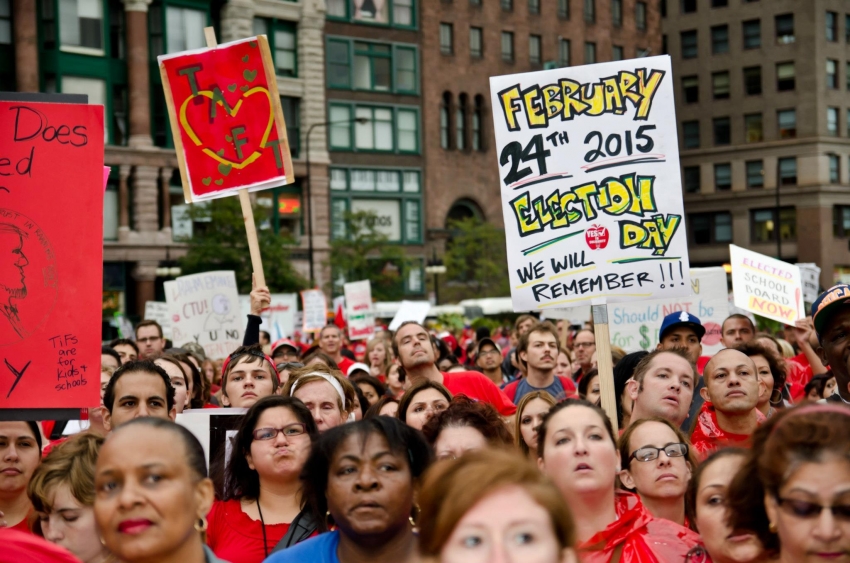How Chicago’s Grassroots Movements Defeated Rahm Emanuel at the Polls

On Tuesday, February 24, Jesús “Chuy” García shook up Chicago, and the nation, by forcing a key pro-corporate Democratic Party figurehead and the mayor of the 1%, Rahm Emanuel, into a run-off election for mayor of Chicago. The win has unleashed incredible excitement in Chicago—and more than a few questions about how this runoff was achieved. Many observers’ first instinct might be to ask, "What changed in Chicago?” But for those looking for lessons in the grassroots-powered victory, a more instructive question would be, "What was built—and how"?
Tuesday’s success is bigger than any one organization. What Chicago’s various social movements have built did not materialize over the course of one election cycle and cannot be understood as just a set of electoral strategies, clever tactics or shrewd messaging. For years, Chicago has been an epicenter of militant, grassroots organizing that has come to deeply resonate with working class families. A long-term transformative vision lies at the heart of this organizing, taking aim at oppressive systems and corporate interests that exploit and divide people along lines of class and race.
From the occupation of Republic Windows and Doors by rank-and-file workers to the occupation of schools and mental health clinics closed by Emanuel in black and brown communities; from the Chicago Teachers Union strike of 2012 to sustained action against the Chicago Mercantile Exchange and LaSalle Street banks; from radical immigrant youth organizing against deportations and xenophobia to the #BlackLivesMatter movement; community and labor organizers have been waging a clear, escalating fight against the corporate agenda. The foundation for the February 24 election was built over four years of coalition work; popular education; big, bold fights; and a clear analysis around race and class.
Our movement is broad and deep. Here’s how we built it.
Building up electoral strength
We have greater electoral capacity than ever before. SEIU Healthcare Illinois Indiana (HCII) drove significant resources in 2014 to community organizations to register over 100,000 new voters in Cook County, most of whom were in Chicago. When Chicago Teachers Union (CTU) President Karen Lewis was unable to run for mayor after a brain tumor diagnosis, she and her union made a quick endorsement of García. This gave the instant credibility, palpable excitement and real boots-on-the-ground capacity that was needed to get over 60,000 petition signatures for García to get on the ballot in one month’s time—more signatures than any other candidate, including Emanuel.
Indeed, Karen Lewis’ role in this moment cannot be underestimated. She captured the imagination—and the support—of working and middle class families across the city, because she was such a fierce fighter for equity and justice. The clarity of her repeated message that the moment was about the movement, that the grassroots organizing had built up to such a pitch that City Hall was firmly within reach, was pivotal. When the CTU and SEIU HCII fully backed García, it gave him a base of resources to build upon. With additional support from house parties in neighborhoods across the city and small online donations, García raised enough money to credibly compete.
Coalitions have power
In December 2010, just a few months after six-term mayor Richard M. Daley announced he would not run for re-election, Grassroots Collaborative organized a mayoral candidate forum attended by 2,600 people, including members of more than 30 community organizations across the city. The power and excitement of that room—a room that reflected the diversity of Chicago’s neighborhoods—created a sense of political possibility. The election of Emanuel a few months later, though How Chicago’s Grassroots Movements Defeated Rahm Emanuel at the Polls - Working In These Times:
Click here to go to Jesus "Chuy" Garcia for Mayor of Chicago Website
